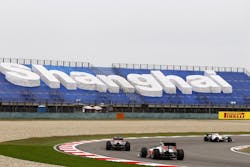Tire strategy will be at the forefront of one of the most technically demanding races of the year, as Pirelli returns to Shanghai for the Chinese Grand Prix. Last year, the top three finishers all used different strategies at a race that was not decided until the final lap – and with Pirelli having closed up the performance gaps between the compounds this year, the accent on strategy will now be even stronger.
Pirelli is bringing its P Zero White medium compound and P Zero Yellow soft compound tires to China: a circuit is well known for its fast and sweeping corners, as well as some long straights and heavy braking areas.
All these factors make tire strategy extremely important, with a three-stop strategy having provided the pure speed needed to win the race last year. The medium and the soft tires guarantee the best compromise between grip and performance on this circuit, but rain is a common occurrence as well, so the Cinturato Green intermediates and Cinturato Blue full wets could also make an appearance. Unlike Malaysia, where the showers tend to be short and heavy, the rain in China is frequently light but long-lasting, making it ideal territory for the intermediate.
PIRELLI’S MOTORSPORT DIRECTOR SAYS:
Paul Hembery: “China proved to be one of the most fascinating races in our first year, with tire strategy at the heart of it, so we have a tough act to follow. However, the philosophy we have adopted this year actually extends the window of peak performance on the slick tires, which means that the drivers should be able to race harder and closer. Although ambient temperatures can be quite low in China, tire degradation is traditionally high due to the unique track layout. So although we have the same nomination as we saw in Australia – medium and soft – our P Zeros will face a quite different challenge next week in Shanghai.”
THE MEN BEHIND THE STEERING WHEEL SAY:
Sergio Perez, Sauber F1 Team: “For the tires in Shanghai it is very important to get the car’s set up right, especially for the front axle. The long high-speed corners, in particular turn one, put a lot of load on the front tires and you have to make sure you don’t lose them too quickly. This is what is most important in terms of tires for the Shanghai International Circuit. I am very much looking forward to that race. We have proven that the Sauber C31-Ferrari can be competitive. Now we have to keep our head down and work hard for further improvements.”
PIRELLI’S TEST DRIVER SAYS:
Jaime Alguersuari: “China is a circuit where the tire use and strategy makes a real difference. If you want some examples, just look at last year’s race: Lewis Hamilton won by making one stop more than Sebastian Vettel, while Mark Webber had a bad qualifying butmade good use of the tires that he had saved to end up third.”
“Two corners in particular stand out, where the tires make a real difference: the key to getting the best of out them is to properly understand how the two different compounds behave: to begin with, the first corner, turn one. This right-hander feels like it is going on forever when you drive it and the radius gets tighter and tighter, until it turns back on itself completely. The tires have to work really hard here in order to maintain the ideal line.”
“The other key corner is turn 13: the long right-hander just before the main straight. It’s a fast corner, which is slightly banked, where the tires are increasingly loaded as you accelerate towards the straight and the DRS zone. Getting good traction out of this corner is vital – particularly in qualifying – so that you can carry plenty of speed onto the straight, which is crucial to your lap time.”
TECHNICAL TIRE NOTES:
• Pirelli will bring the same tire combination as was nominated for Australia, the P Zero White medium and the P Zero Yellow soft, but this time they face a very different challenge.
• The circuit layout in China tends to be more demanding than Albert Park, with a brakingarea at the end of the main straight for example where the cars go from 320kph to 68kph in less than 130 meters: a deceleration of 6G, which is one of theheaviest that the tires face all year.
• The lateral forces on the tires, in the flowing mid-section of the lap, are the equivalent of 3G.
• The heavy braking that is a characteristic of China tends to put more strain on the front tires than the rears. The fronts are also worked during turn one – which is almost a full circle – as the cars are relying purely on mechanical rather than aerodynamic grip.
• The surface is medium-grip but less aggressive than Malaysia. The banking on turn 13 increases the strain on the tire structure, as the contact patch can increase to three times its normal size.
• Lewis Hamilton is the only two-time winner in China. Apart from him, there has been a different winner every year since the inaugural race in 2004, underlining the varied challenges of the Shanghai circuit.
• Last year, Sebastian Vettel set the fast-ever lap in qualifying at the Shanghai circuit: 1m33.706s, using the 2011 P Zero Yellow soft tire.
Latest in Retail
Latest in Retail



